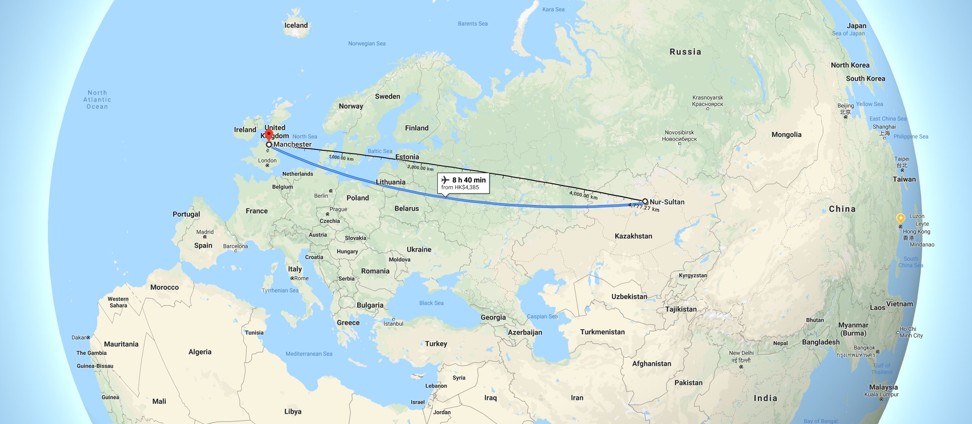
Manchester United tackling new frontiers in Europa League as they prepare to travel 2,000km further east than ever before
- Manchester United’s opponents, FC Astana, are from a city which is closer to Hong Kong than to Manchester
- Astana are located further east than some Asian countries
The group stages start this week in the Uefa Champions League and Europa League. “Europe” maybe considered “continental Europe” in the United Kingdom during these Brexit times, but the continent also comprises the western part of Eurasia. Europe is separated from Asia by the watershed divides of the Ural and Caucasus Mountains. To the southeast, one of the most familiar boundaries is the Bosporus running through Istanbul.
Fenerbahce play on the Asian side of Istanbul, but take part in European competition since, politically, Turkey is part of Europe, even though only three per cent of the country lies in it. That statistic was to prove useful for another country, much further east.
There are the usual Champions League ties this week: Dortmund vs Barcelona, Chelsea vs Valencia, PSG vs Real Madrid or Napoli against holders Liverpool. In the Europa League, the familiar names of Feyenoord, AS Roma, Rangers or Celtic are there – alongside the far less familiar RZ Pellets WAC and FC Oleksandria.
And then there are Manchester United’s opponents, FC Astana, from a city closer to Hong Kong than to Manchester. Kazakhstan, where Astana play, is not listed in the “Rough Guide to Europe” because it’s not in Europe. Astana is so far east that it is the only club not on the map in the Wikipedia guide to the Europa League.
Situated to the south of the vast territory of Kazakhstan with no access to the oceans, neighbouring Kyrgyzstan’s team play in the Asian Football Confederation.
Until it was changed to Nur-Sultan this year, Astana was the name for the capital city of Kazakhstan. The football team have retained their name, one synonymous with domestic success. The Kazakh champions will visit Old Trafford on Thursday with the second leg at the end of November when the average temperature there is minus 12 degrees Celsius. It will be United’s farthest “European” fixture in their history, a full 2,000 kilometres farther east beyond Volgograd where United played in the equivalent competition in 1995, but why are they playing in Uefa when it’s so far east, farther even than Kyrgyzstan?
Their Uefa coefficient puts them above Lokomotiv Moscow and just below Fenerbahce and Borussia Monchengladbach. The cold means their domestic season only runs from March to September
Oil-rich Kazakhstan, a former Soviet republic, joined Uefa in 2002 after resigning from the Asian Football Confederation the previous year. They argued that 12 per cent of their territory is in Europe – which is a lot more than Turkey’s three per cent. It’s a sparsely populated land of only 18 million, but it has strong German cultural connections, many of its residents are descendants of the Volga Germans exiled to the western part of the country by Josef Stalin after the second world war.
Kazakhstan also has money. Money to invest in new stadiums, in training programmes for footballers. The country’s top-flight sides built training centres modelled on the German system and overseen by the German Football Association.

Kazakhstan wanted to evolve as a European footballing national rather than an Asian one, playing stronger teams and hopefully taking advantage of the expansion of the European Championship to 24 teams.
It has not quite gone to plan. While eight of their past nine national team coaches have been brought in from outside the country to bring expertise and influence, Kazakhstan, yet to qualify for a World Cup finals or Uefa championship, are ranked 112th in the world, sandwiched between Zimbabwe and Central African Republic and just ahead of Hong Kong.
They’re 45th of the 54 nations under Uefa’s umbrella and well below their central Asian neighbours, 84th-placed Uzbekistan. Kazakhstan did not win any of their 10 qualifying games for the 2018 World Cup finals in neighbouring Russia, yet they did beat Scotland (who doesn’t?) 3-0 in a qualifier for Euro 2020 in March. They drew in Cyprus and were only defeated 1-0 by Russia in their last competitive game last week. Such results point to a brighter future, while United’s opponents Astana FC are as used to winning as they are to travel.
They set off for Manchester at 4pm on Monday, over three days before the game at Old Trafford.
“There’s a lot of travel,” Astana’s playmaker, the Icelandic, Runar Mar Sigurjonsson told SCMP. “We’ve already played eight European games before this group stage starts, but it’s a good club and we’re delighted to be playing Manchester United. We were frustrated to miss out on the Champions League because we felt the games against Cluj last time were very equal. We beat them at home but lost 1-3 away. But drawing United gave us a huge lift.”
Astana, who were only founded in 2009, are no pushovers. They finished second in their 2017-18 Europa League group and held Sporting Lisbon away in the last-32. United will be their first ever English opponents, though they beat Celtic at home in 2017. Their Uefa coefficient puts them above Lokomotiv Moscow and just below Fenerbahce and Borussia Monchengladbach. The cold means their domestic season only runs from March to September.
No matter how Far East Astana is, there’s one connection with Manchester. Runar is a Manchester United fan who used to travel annually to Old Trafford until he became a professional footballer.

